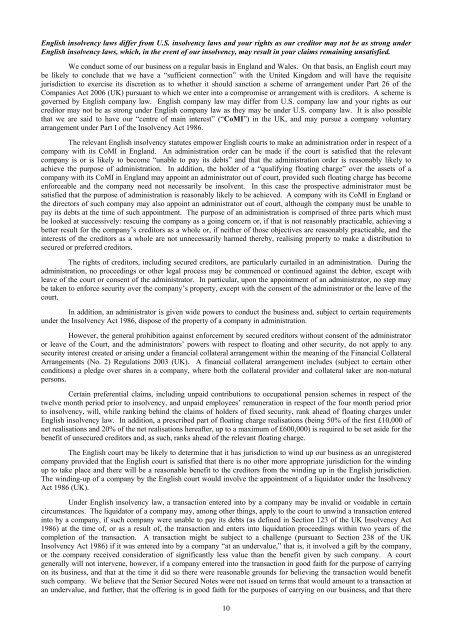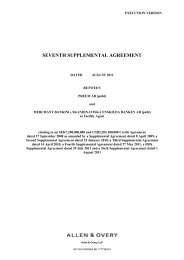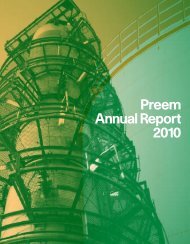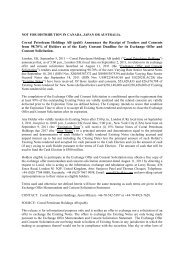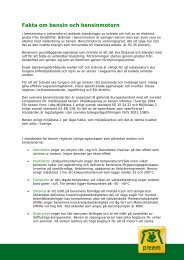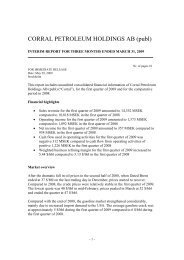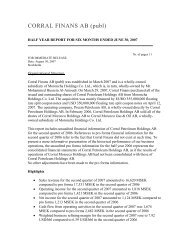Notes, we would try to obtain waivers of such prohibitions from the lenders under those arrangements, or we couldattempt to refinance the borrowings that contain the restrictions. If we could not obtain the waivers or refinance theseborrowings, we would be unable to repay or repurchase the Senior Secured Notes. Our failure to repay or repurchase theSenior Secured Notes would be an event of default under the Senior Secured Indenture and would, therefore, have amaterial adverse effect on us.We and our subsidiaries, including <strong>Preem</strong>, may be able to incur substantially more debt, which could furtherexacerbate the risks described above.Although the agreements governing many of our financing arrangements contain restrictions on the incurrenceof additional debt, these restrictions are subject to a number of significant qualifications and exceptions. Thus, we andour subsidiaries may be able to incur substantial additional debt, including secured debt. Any future indebtedness of<strong>Preem</strong> or any of our other subsidiaries whether or not secured is structurally senior to the Senior Secured Notes. Inaddition, to the extent we incur additional indebtedness, the substantial leverage risks described above would increase.We are controlled by one shareholder whose interests as they relate to us may conflict with your interests.All of our share capital is owned by Moroncha Holdings, and all of the share capital of Moroncha Holdings isowned by Mr. Mohammed Hussein Al-Amoudi. Our board of directors consists of designees of Moroncha Holdings,whose board of directors consists of designees of Mr. Al-Amoudi. Mr. Al-Amoudi is also the Chairman of our board ofdirectors and that of <strong>Preem</strong>. As a result, Mr. Al-Amoudi indirectly controls our operations and has the power to approveany action requiring shareholder approval (including adopting amendments to our articles of association and approvingmergers or sales of all or substantially all of our assets). It is possible that the interests of Moroncha Holdings andMr. Al-Amoudi, including as our shareholders, may conflict with your interests as noteholders.If we incur substantial operating losses or a reduction in the value of our assets, we may be subject to liquidationunder Swedish law, which would severely restrict our ability to meet our debt obligations.In light of the several possible risks to our business discussed herein, including our debt denominated in foreigncurrency, we may record losses that would reduce our share capital. To the extent these reductions are substantial, wewould need to take measures to avoid liquidation under the Swedish Companies Act (aktiebolagslagen). Such measurescould include, among other things, raising more equity from Mr. Al-Amoudi, who is under no obligation to contributemore equity. Losses to our share capital may lead to our liquidation under Swedish company law, which wouldconstitute an event of default under the Senior Secured Indenture related to the Senior Secured Notes.Under Swedish law, whenever the company’s board of directors has a reason to assume that, as a result of lossesor reductions in the value of our assets, or the assets of any of our subsidiaries, or any other event, our equity, or theequity of any of our subsidiaries, is less than half the registered share capital, the board of directors of such companyshall prepare a special balance sheet (Sw: kontrollbalansräkning) and have the auditors examine it. The same obligationarises if we or such subsidiary in connection with a seizure pursuant to Chapter 4 of the Debt Recovery Act(Sw: utsökningsbalken) is found to lack seizeable assets.If the special balance sheet shows that the equity of such company is less than half of the registered sharecapital, the board of directors shall, as soon as possible, issue notice to call a general meeting which shall considerwhether the company shall go into liquidation (initial general meeting). The special balance sheet and an auditor’s reportwith respect thereto shall be presented at the initial general meeting.If the special balance sheet presented at the initial general meeting fails to show that, on the date of suchmeeting, the equity of the company amounts to the registered share capital and the initial general meeting has notresolved that the company shall go into liquidation, the general meeting shall, within eight months of the initial generalmeeting, reconsider the issue whether the company shall go into liquidation (second general meeting). Prior to thesecond general meeting, the board of directors shall prepare a new special balance sheet and cause such to be reviewedby the company’s auditors. The new special balance sheet and an auditor’s report thereon shall be presented at thesecond general meeting.A court of general jurisdiction shall order that the company go into liquidation where (i) a second generalmeeting is not held within the period of time stated above or (ii) the new special balance sheet which was presented at thesecond general meeting was not reviewed by the company’s auditor or fails to show that, on the date of such meeting, theequity of the company amounts to at least the registered share capital and the general meeting did not resolve that thecompany shall go into liquidation.In such cases as referred to in the paragraph above, the board of directors shall petition the court for aliquidation order. The petition shall be submitted within two weeks from the second general meeting or, where suchmeeting has not been held, from the latest date on which the meeting should have been held.9
English insolvency laws differ from U.S. insolvency laws and your rights as our creditor may not be as strong underEnglish insolvency laws, which, in the event of our insolvency, may result in your claims remaining unsatisfied.We conduct some of our business on a regular basis in England and Wales. On that basis, an English court maybe likely to conclude that we have a “sufficient connection” with the United Kingdom and will have the requisitejurisdiction to exercise its discretion as to whether it should sanction a scheme of arrangement under Part 26 of theCompanies Act 2006 (UK) pursuant to which we enter into a compromise or arrangement with is creditors. A scheme isgoverned by English company law. English company law may differ from U.S. company law and your rights as ourcreditor may not be as strong under English company law as they may be under U.S. company law. It is also possiblethat we are said to have our “centre of main interest” (“CoMI”) in the UK, and may pursue a company voluntaryarrangement under Part I of the Insolvency Act 1986.The relevant English insolvency statutes empower English courts to make an administration order in respect of acompany with its CoMI in England. An administration order can be made if the court is satisfied that the relevantcompany is or is likely to become “unable to pay its debts” and that the administration order is reasonably likely toachieve the purpose of administration. In addition, the holder of a “qualifying floating charge” over the assets of acompany with its CoMI in England may appoint an administrator out of court, provided such floating charge has becomeenforceable and the company need not necessarily be insolvent. In this case the prospective administrator must besatisfied that the purpose of administration is reasonably likely to be achieved. A company with its CoMI in England orthe directors of such company may also appoint an administrator out of court, although the company must be unable topay its debts at the time of such appointment. The purpose of an administration is comprised of three parts which mustbe looked at successively: rescuing the company as a going concern or, if that is not reasonably practicable, achieving abetter result for the company’s creditors as a whole or, if neither of those objectives are reasonably practicable, and theinterests of the creditors as a whole are not unnecessarily harmed thereby, realising property to make a distribution tosecured or preferred creditors.The rights of creditors, including secured creditors, are particularly curtailed in an administration. During theadministration, no proceedings or other legal process may be commenced or continued against the debtor, except withleave of the court or consent of the administrator. In particular, upon the appointment of an administrator, no step maybe taken to enforce security over the company’s property, except with the consent of the administrator or the leave of thecourt.In addition, an administrator is given wide powers to conduct the business and, subject to certain requirementsunder the Insolvency Act 1986, dispose of the property of a company in administration.However, the general prohibition against enforcement by secured creditors without consent of the administratoror leave of the Court, and the administrators’ powers with respect to floating and other security, do not apply to anysecurity interest created or arising under a financial collateral arrangement within the meaning of the Financial CollateralArrangements (No. 2) Regulations 2003 (UK). A financial collateral arrangement includes (subject to certain otherconditions) a pledge over shares in a company, where both the collateral provider and collateral taker are non-naturalpersons.Certain preferential claims, including unpaid contributions to occupational pension schemes in respect of thetwelve month period prior to insolvency, and unpaid employees’ remuneration in respect of the four month period priorto insolvency, will, while ranking behind the claims of holders of fixed security, rank ahead of floating charges underEnglish insolvency law. In addition, a prescribed part of floating charge realisations (being 50% of the first £10,000 ofnet realisations and 20% of the net realisations hereafter, up to a maximum of £600,000) is required to be set aside for thebenefit of unsecured creditors and, as such, ranks ahead of the relevant floating charge.The English court may be likely to determine that it has jurisdiction to wind up our business as an unregisteredcompany provided that the English court is satisfied that there is no other more appropriate jurisdiction for the windingup to take place and there will be a reasonable benefit to the creditors from the winding up in the English jurisdiction.The winding-up of a company by the English court would involve the appointment of a liquidator under the InsolvencyAct 1986 (UK).Under English insolvency law, a transaction entered into by a company may be invalid or voidable in certaincircumstances. The liquidator of a company may, among other things, apply to the court to unwind a transaction enteredinto by a company, if such company were unable to pay its debts (as defined in Section 123 of the UK Insolvency Act1986) at the time of, or as a result of, the transaction and enters into liquidation proceedings within two years of thecompletion of the transaction. A transaction might be subject to a challenge (pursuant to Section 238 of the UKInsolvency Act 1986) if it was entered into by a company “at an undervalue,” that is, it involved a gift by the company,or the company received consideration of significantly less value than the benefit given by such company. A courtgenerally will not intervene, however, if a company entered into the transaction in good faith for the purpose of carryingon its business, and that at the time it did so there were reasonable grounds for believing the transaction would benefitsuch company. We believe that the Senior Secured Notes were not issued on terms that would amount to a transaction atan undervalue, and further, that the offering is in good faith for the purposes of carrying on our business, and that there10
- Page 2: TABLE OF CONTENTSDisclosure Regardi
- Page 5: which was merged into Preem on Octo
- Page 8 and 9: RISK FACTORSThe risk factors below
- Page 10 and 11: the cost of exploring for, developi
- Page 12 and 13: purchase a minimum of 10% to 20% of
- Page 14 and 15: market price at the time of settlem
- Page 18 and 19: are reasonable grounds for believin
- Page 20 and 21: civil liability, whether or not pre
- Page 22 and 23: SELECTED CONSOLIDATED FINANCIAL DAT
- Page 24 and 25: MANAGEMENT’S DISCUSSION AND ANALY
- Page 26 and 27: Year ended December 31,%2008 2009 C
- Page 28 and 29: arrel in February, increased to app
- Page 30 and 31: (1) Includes sales by our supply an
- Page 32 and 33: SEK 5,519 million, from a loss of S
- Page 34 and 35: Cash flow used in investment activi
- Page 36 and 37: Restrictions on transfers of fundsW
- Page 38 and 39: Variable rate debt—amount due .
- Page 40 and 41: As of December 31, 2008, SEK 21,999
- Page 42 and 43: Our StrengthsOur competitive streng
- Page 44 and 45: Lysekil has a total storage capacit
- Page 46 and 47: Unfinished and Blend Stocks........
- Page 48 and 49: Heating Oil .......................
- Page 50 and 51: Business-to-Business DivisionWe pre
- Page 52 and 53: “.nu,” “.org,” “.biz,”
- Page 54 and 55: Energy AB, Huda Trading AB, the Swe
- Page 56 and 57: was incorporated on March 22, 2007,
- Page 58 and 59: RELATED PARTY TRANSACTIONSCapital T
- Page 60 and 61: DESCRIPTION OF CERTAIN INDEBTEDNESS
- Page 62 and 63: effected by the Third Supplemental
- Page 64 and 65: first ranking mortgage certificates
- Page 66 and 67:
LEGAL INFORMATIONCorral Petroleum H
- Page 68 and 69:
CORRAL PETROLEUM HOLDINGS AB (publ)
- Page 70 and 71:
CORRAL PETROLEUM HOLDINGS AB (publ)
- Page 72 and 73:
CORRAL PETROLEUM HOLDINGS AB (publ)
- Page 74 and 75:
CORRAL PETROLEUM HOLDINGS AB (publ)
- Page 76 and 77:
SubsidiariesSubsidiaries are compan
- Page 78 and 79:
The refinery installations consist
- Page 80 and 81:
of occupational pension insurance,
- Page 82 and 83:
Emission rights 2010LysekilGothenbu
- Page 84 and 85:
NOTE 2. FINANCIAL RISK MANAGEMENTTh
- Page 86 and 87:
In addition to price risk managemen
- Page 88 and 89:
The fair value of borrowing is calc
- Page 90 and 91:
Reconciliation with the Group’s t
- Page 92 and 93:
The Board members including the Cha
- Page 94 and 95:
NOTE 12. EXPENSES BROKEN DOWN BY TY
- Page 96 and 97:
NOTE 16. EXCHANGE RATE DIFFERENCES
- Page 98 and 99:
Equipment, tools, fixtures and fitt
- Page 100 and 101:
NOTE 23. TRADE AND OTHER RECEIVABLE
- Page 102 and 103:
The change in the fair value of pla
- Page 104 and 105:
Loan conditions, effective interest
- Page 106 and 107:
Capitalized interest cost..........
- Page 108:
SalesDecember 31, 2009AccountsPurch


